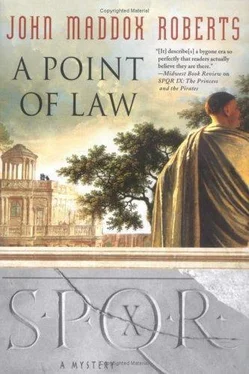John Roberts - A Point of Law
Здесь есть возможность читать онлайн «John Roberts - A Point of Law» весь текст электронной книги совершенно бесплатно (целиком полную версию без сокращений). В некоторых случаях можно слушать аудио, скачать через торрент в формате fb2 и присутствует краткое содержание. Год выпуска: 0101, ISBN: 0101, Издательство: St. Martin, Жанр: Исторический детектив, на английском языке. Описание произведения, (предисловие) а так же отзывы посетителей доступны на портале библиотеки ЛибКат.
- Название:A Point of Law
- Автор:
- Издательство:St. Martin
- Жанр:
- Год:0101
- ISBN:9780312337254
- Рейтинг книги:5 / 5. Голосов: 1
-
Избранное:Добавить в избранное
- Отзывы:
-
Ваша оценка:
- 100
- 1
- 2
- 3
- 4
- 5
A Point of Law: краткое содержание, описание и аннотация
Предлагаем к чтению аннотацию, описание, краткое содержание или предисловие (зависит от того, что написал сам автор книги «A Point of Law»). Если вы не нашли необходимую информацию о книге — напишите в комментариях, мы постараемся отыскать её.
A Point of Law — читать онлайн бесплатно полную книгу (весь текст) целиком
Ниже представлен текст книги, разбитый по страницам. Система сохранения места последней прочитанной страницы, позволяет с удобством читать онлайн бесплатно книгу «A Point of Law», без необходимости каждый раз заново искать на чём Вы остановились. Поставьте закладку, и сможете в любой момент перейти на страницу, на которой закончили чтение.
Интервал:
Закладка:
There was a large cut slanting from just behind his left ear to the joining of the collarbones. This wound alone would have been sufficient to kill him. None of the others I could see would have been immediately fatal. There were no wounds visible on his limbs or head.
“Turn him over,” I told the undertakers. They rolled him over. There were no wounds on his back.
“That poor bastard died hard.” I looked up to see Sallustius, who was never far from the center of excitement in Rome.
“Any man who’s served in the legions knows how to kill a man better than that,” Cato said. “A quick stab in the right place is all it takes. He must have been set upon by common cutthroats.”
I looked at the tunic, which was almost stiff with blood. It was a dark one, made of coarse cloth. The almost equally bloody toga was little better, made of raw, undyed wool, a dingy brown color.
I stood. “He wasn’t on his way to court dressed like this,” I noted. “And look how nearly dry this blood is. He must have died hours ago. I want this body taken to the Temple of Venus Libitina before it’s turned over to his family so that Asklepiodes can examine it.”
“You have no authority to order such a thing,” Juventius reminded me. “But I’ll order it so. If your prosecutor wants an explanation, it’s because the end of the year is near and you have little time to formulate your defense, so I am allowing you extraordinary privileges to clear yourself.” He left it unsaid that I now owed him a big political favor.
I took Hermes by the shoulder. “Go get Asklepiodes. Tell him to meet with me and the unfortunate Marcus Fulvius at the temple immediately.”
“I’m off.” And so he was.
“What do you expect to learn from the Greek?” Father wanted to know.
“I have some fairly strong suspicions, and I’d like to have them confirmed by an expert. I’ll explain when I am more certain of the facts.”
They all took on the look they got when I spoke of my methods of ferreting out the facts of a case. I had won many prosecutions my way, but it never convinced them. They thought the proper way to win a case was to get prominent people to swear to your innocence and the vileness of your opponent. Then you bribed the jury.
A litter made its way across the Forum and stopped at the basilica. Hortensius Hortalus emerged, accompanied by the aged Claudius Marcellus. Still augur-robed and leaning on his lituus , he trudged up the steps to where we stood.
“What’s all this?” he asked, looking down at the body. His friends filled him in on the morning’s doings while I examined the steps. I hoped to find signs of whether the body had been dragged or carried to the basilica, but the crowd had gathered too quickly. If there had been bloodstains, they were now on the bottoms of a thousand pairs of sandals. I was, however, certain that the murder had not been committed on the spot where the body was found. There would have been a small river of blood running down the steps, more than could have been obliterated by a legion tramping through.
“Did you perceive any omens?” I asked Hortalus.
“Not a thing,” he admitted. “It was too cloudy to see the stars, no birds flew in the night, and we heard no thunder from any direction. Of course, since there’s to be no trial, omens were scarcely called for. Marcus Fulvius was no prince, so comets and bloody rains are hardly to be expected.”
“It would have been convenient,” Cato said, “if you’d seen something to stop this convening of the Plebeian Assembly.”
“Actually,” Father put in, “some good legal advice is what is called for now.”
Hortalus turned to me. “Decius, I think you should find out whatever you can to blacken the reputation of Marcus Fulvius. Treason would be nice.”
I managed to shake my way free of Sallustius and the others and made my way to the Temple of Venus in her aspect as death goddess. It had recently been handsomely restored by Caesar. Although his family traced their descent from Venus Genetrix, Caesar had been generous to any temple of Venus in need of refurbishing.
Asklepiodes arrived shortly after I did, carried on a fine litter by a team of matched Nubians. Hermes and two of the physician’s Egyptian slaves followed. He had grown quite wealthy over the years, and, unlike most of his profession, he did it through sound medical practice not by selling quack cures. He was the only physician to whom I entrusted my lacerations.
“Greetings, Decius Caecilius!” he said, alighting from his conveyance. “Rejoice! So lately returned to Rome; so soon involved in a murder!”
“Not just involved. Accused.”
“And not for the first time. Let’s have a look at the departed.”
The body had been laid out on a bier and washed. With the blood off him Marcus Fulvius looked, if anything, even more ghastly. There is something especially grotesque about a body that has had all the blood drained from it. He was white as a cauliflower, except for the relatively colorful bulges of viscera. Even the gaping wounds were pale pink instead of scarlet. Adding to the strangeness of the scene was the contrast between the ravaged body and the untouched head and limbs.
Asklepiodes made a gesture and the Egyptians came forward. One carried, by a strap over his shoulder, a box elaborately decorated with mother-of-pearl and lapis lazuli. This man opened the box and the other, at Asklepiodes’ murmured instructions, removed surgical instruments and began to probe at the wounds. In his own surgery, Asklepiodes might have wielded the instruments himself, but he would never allow the priests of the temple to see a haughty physician using his hands like a common surgeon. As each wound was spread wider he leaned over, examined it, and made wise sounds. Finally, he stepped back.
“Well?” I said.
“No doubt about it, this man is dead.”
“It is good to be in the presence of genius. What else?”
“Someone was being-how shall I put this? — rather delicate about this murder. We have the marks of at least three different blades, any one of which would have been quite sufficient to cause death, but they were used to deal wounds that were grievous, some of them fatal over a matter of hours or days, yet not causing immediate death.”
“Cato noted the inefficiency of the blows,” I said, “and he is not a particularly observant man.”
“The cut to the great vessel of the neck”-Asklepiodes pointed to the wound below the left ear-“would have been fatal within seconds, yet I believe it was dealt last, as if the man were being too leisurely about dying. All these stabs to the abdomen for instance. A single stab here,” he pointed to the apex of the rib arch just below the sternum, “angled slightly upward, would have pierced the heart and brought about immediate death. I have the distinct impression that these men did not want their victim to die quickly.”
“You mentioned three weapons.”
“At least three, possibly more.”
“Can you describe them?”
“There were two types: one narrow-bladed, the other broad. I see wounds produced by at least one of these narrow blades. The dagger was no more than an inch wide, its cross-section of a flattened diamond shape. There were at least two broad-bladed daggers used: both were in excess of two inches wide, one made of rather thin steel with a thickened midrib for rigidity. The other was of stouter metal without the midrib. Instead it had three parallel grooves to add strength and rigidity to the blade, as well as to lighten it and confer better balance.” As physician to the gladiators of the Statilian ludus , his knowledge of edged weapons was comprehensive.
“Like a soldier’s pugio?” I asked.
Читать дальшеИнтервал:
Закладка:
Похожие книги на «A Point of Law»
Представляем Вашему вниманию похожие книги на «A Point of Law» списком для выбора. Мы отобрали схожую по названию и смыслу литературу в надежде предоставить читателям больше вариантов отыскать новые, интересные, ещё непрочитанные произведения.
Обсуждение, отзывы о книге «A Point of Law» и просто собственные мнения читателей. Оставьте ваши комментарии, напишите, что Вы думаете о произведении, его смысле или главных героях. Укажите что конкретно понравилось, а что нет, и почему Вы так считаете.









